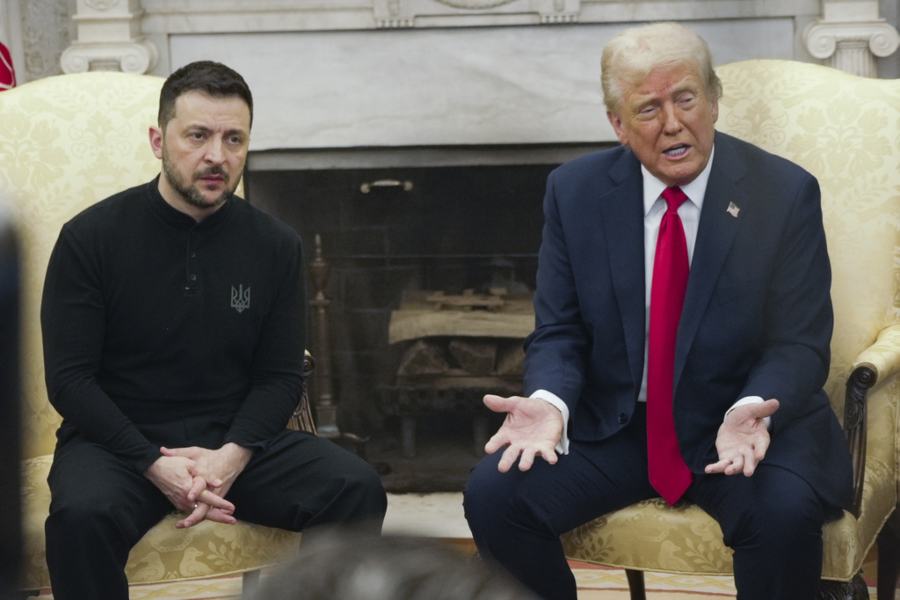In a stunning turn of events that could reshape the trajectory of the Russia- Ukraine war, former President Donald Trump abruptly canceled the signing of a critical minerals deal with Ukrainian President Volodymyr Zelenskyy during a heated Oval Office meeting on Friday.
The dramatic encounter, which unfolded in front of reporters, saw Trump accusing Zelenskyy of being “disrespectful” to the United States and casting doubt on Ukraine’s willingness to pursue peace. The fallout has sent shockwaves across the international diplomatic community.
Zelenskyy had arrived at the White House with hopes of signing an agreement to grant the U.S. increased access to Ukraine’s valuable rare earth minerals. The deal was seen as a potential boost to both Ukraine’s economy and its war effort. Instead, the 45-minute meeting ended with Zelenskyy being ushered out by Trump’s advisers following a tense exchange.
“You’re gambling with World War III,” Trump told Zelenskyy, raising his voice in front of gathered media. “What you’re doing is very disrespectful to the country, this country that’s backed you far more than a lot of people say they should have.”
What began as a polite discussion quickly turned combative when Zelenskyy warned against trusting any ceasefire promises from Russian President Vladimir Putin. Trump, defending his past dealings with the Kremlin, dismissed the caution and suggested the minerals deal could end the war.
Vice President JD Vance also joined the confrontation, accusing Zelenskyy of inappropriately airing disagreements in public. “Mr. President, with respect, I think it’s disrespectful for you to come to the Oval Office to try to litigate this in front of the American media,” said Vance.
Zelenskyy attempted to respond but was cut off, prompting Trump to deliver a blistering rebuke about the risks of rejecting diplomatic overtures.
The previously scheduled joint press conference was scrapped. Instead, Trump told reporters before departing for Mar-a-Lago that he no longer believed Zelenskyy was interested in peace, writing on Truth Social, “He disrespected the United States of America in its cherished Oval Office. He can come back when he is ready for Peace.”
Appearing later on Fox News, Zelenskyy called the encounter “not good for both sides,” but reaffirmed that Ukraine could not easily abandon its stance against Russia. “They just want to hear that America is on our side, that America will stay with us. Not with Russia—with us,” he said.
On social media, Zelenskyy expressed gratitude to the American people and their leaders: “Thank you, America, thank you for your support; thank you for this visit. Thank you, @POTUS, Congress, and the American people. Ukraine needs just and lasting peace, and we are working exactly for that.”
Senate Majority Leader Chuck Schumer condemned the confrontation, accusing Trump and Vance of “doing Putin’s dirty work.”
Even Republican Senator Lindsey Graham, typically aligned with Trump, voiced concerns: “I don’t know if you can ever do a deal with Zelenskyy anymore.”
European leaders rallied behind Ukraine following the breakdown in Washington. European Commission President Ursula von der Leyen praised Zelenskyy’s “dignity” and urged him to “be strong, brave, and fearless.” Italian Prime Minister Giorgia Meloni proposed an emergency summit with U.S. and EU allies to “speak frankly” about ongoing support for Ukraine.
The final 10 minutes of the meeting saw the most volatile exchanges. When Zelenskyy pressed for U.S. security guarantees, Trump refused, insisting that the minerals deal was the path forward. “You see the hatred he’s got for Putin,” Trump said. “That’s very tough for me to make a deal with that kind of hate.”
Administration officials later described Zelenskyy’s demeanor as “hostile,” with body language that annoyed Trump. According to insiders, Trump became particularly irritated when Zelenskyy raised concerns unrelated to the minerals deal.
Trump’s handling of the meeting stood in contrast to how former President Joe Biden approached Zelenskyy. While Biden was also frustrated at times, he chose to handle disagreements privately.
Trump, in contrast, declared himself “in the middle” of the Ukraine- Russia conflict, a neutral stance that troubled European allies and left global observers questioning America’s diplomatic direction.
With Ukrainian forces continuing to resist Russia’s slow but steady military advance, Friday’s failed meeting leaves future U.S.-Ukraine cooperation under Trump in doubt. The rare earth minerals deal—which could have reduced reliance on China and bolstered Ukraine’s economy—is now indefinitely stalled.
Zelenskyy aimed to secure firmer commitments from the U.S. but instead encountered intense criticism. His hopes for solidarity and support have been tested, and many fear the incident could signal a deeper shift in America’s role as Ukraine’s primary ally.
Whether this rupture is lasting or reparable remains to be seen. For now, peace in Eastern Europe appears further out of reach than ever before.

